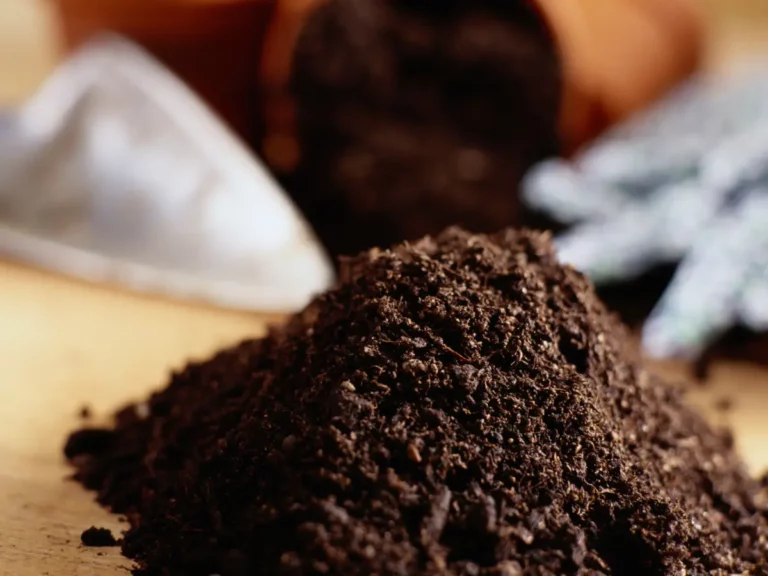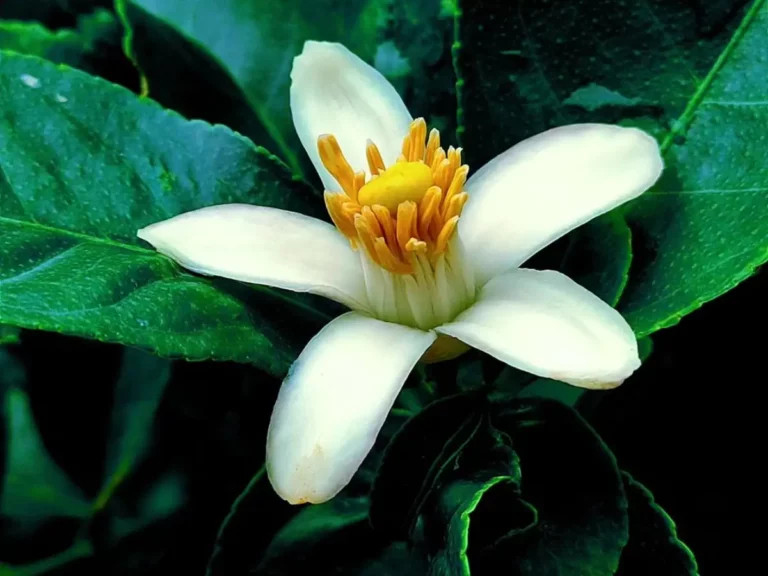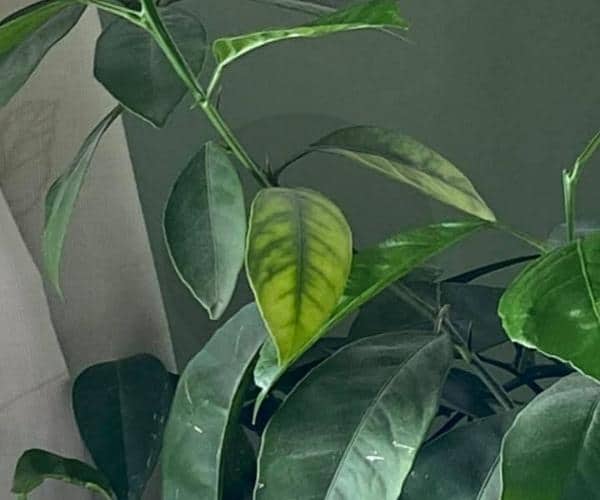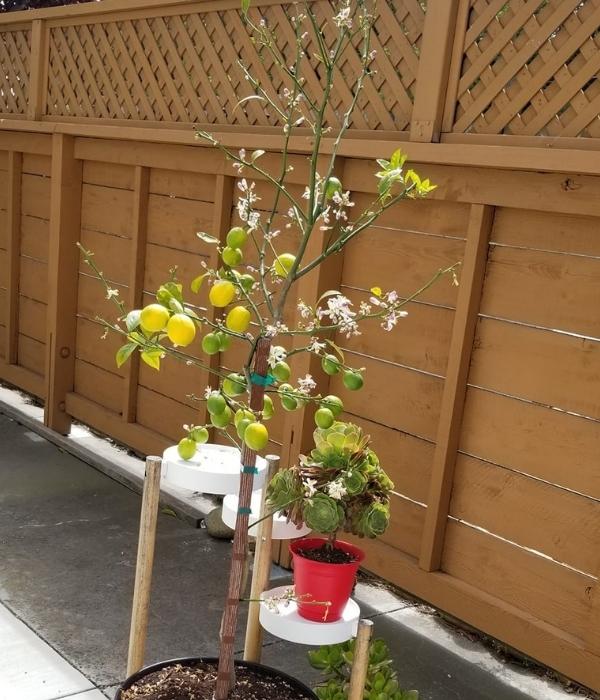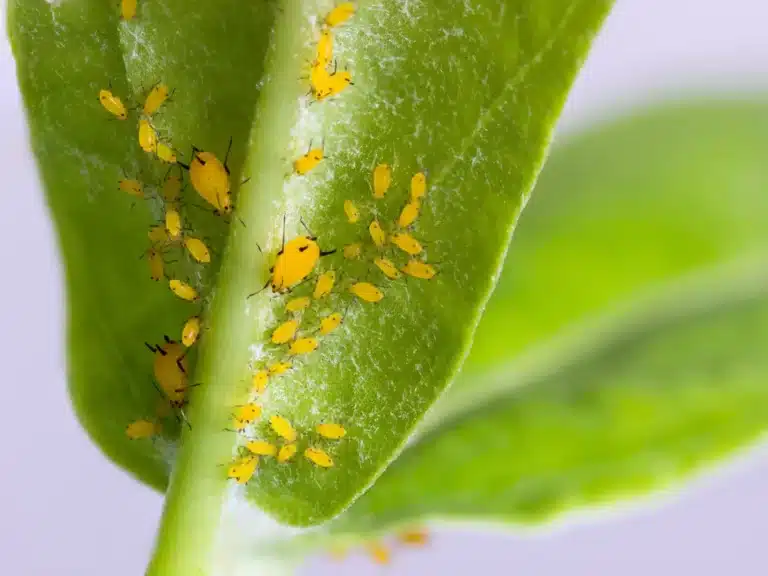9 Best Fertilizers for Citrus Trees in 2022 [Organic + Synthetic]
Citrus trees are heavy feeders and will produce healthy fruit if the fertilizer schedule is properly maintained. They require a high ratio of nitrogen and potassium but low phosphorus.
With that in mind, what’s the best fertilizer for citrus trees, including those growing in containers?
A good fertilizer for citrus trees should have a general 13-7-13 analysis, such as the Miracle-Gro Shake ‘N Feed Continuous Release Fertilizer. It is rich in Nitrogen and potassium with a low amount of phosphorus.
Here are the top 5 fertilizers for growing citrus trees (comparison):
| IMAGE | FERTILIZER | NPK RATIO | RATING | DETAILS |
|---|---|---|---|---|
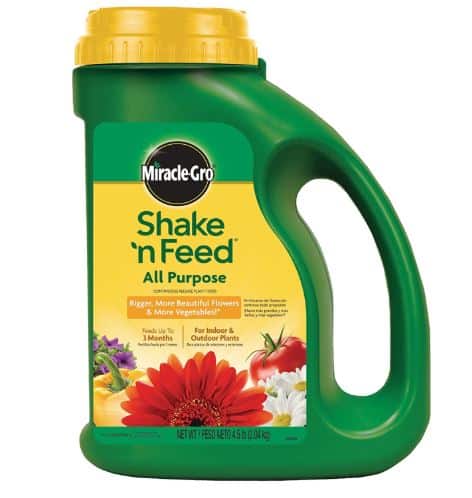
|
Miracle-Gro Shake ‘N Feed | 13-7-13 | ||
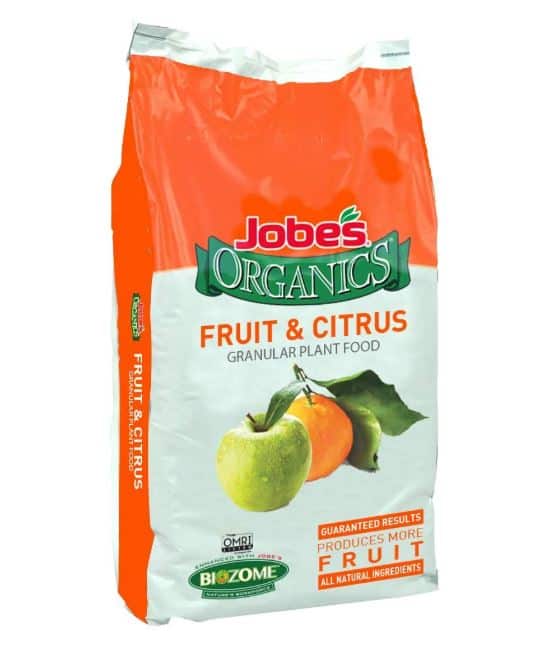
|
Jobe’s Organics Fruit & Citrus Fertilizer | 3-5-5 | ||
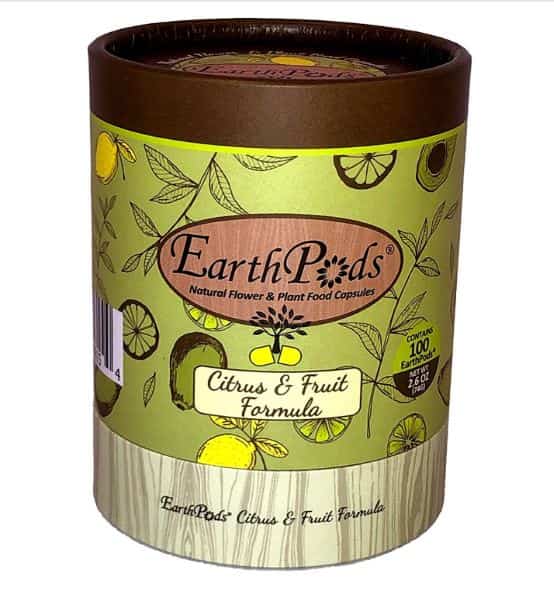
|
EarthPods Premium Fruit & Citrus Plant Food | 0.2-0.2-0.4 | ||
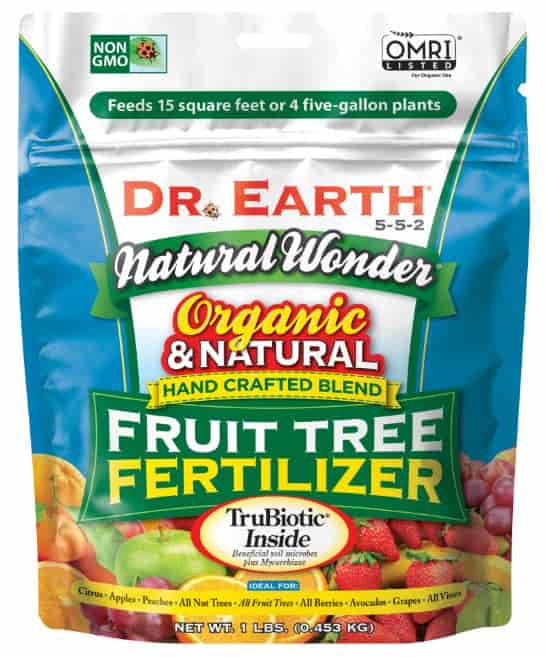
|
Dr. Earth 708P Organic 9 Fruit Tree Fertilizer | 5-5-2 | ||
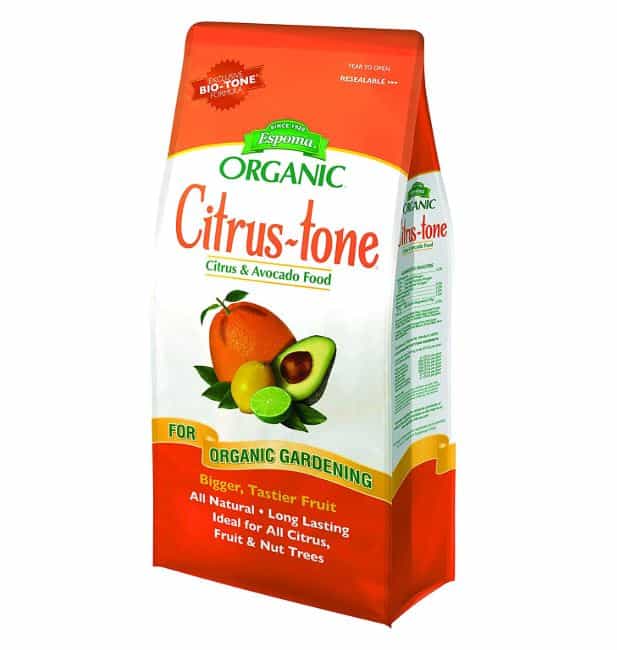
|
Espoma Citrus-tone 5-2-6 Plant Food | 5-2-6 | ||
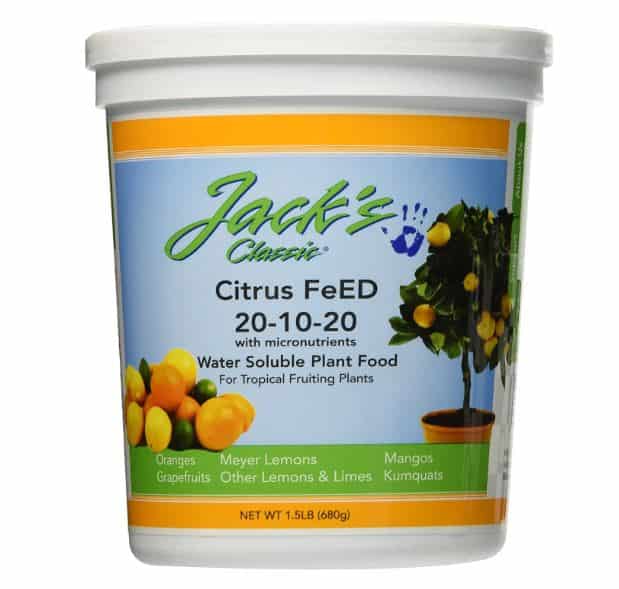
|
Jacks Classic 20-10-20 Citrus Feed | 20-10-20 | ||
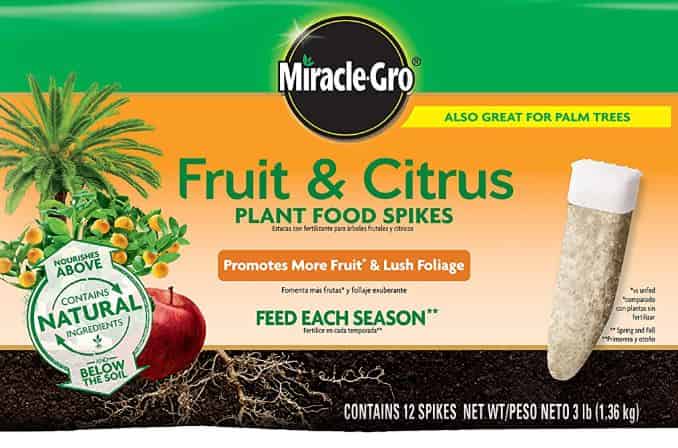
|
Miracle-Gro Fruit and Citrus Plant Food Spikes | 15-5-10 | ||
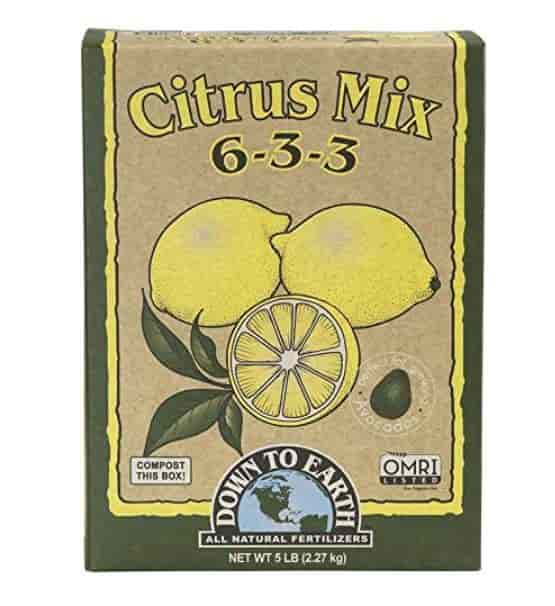
|
Down To Earth Organic Citrus Fertilizer Mix 6-3-3 | 6-3-3 |
Best Fertilizers for Citrus Trees (2022 Edition)
You can grow citrus trees in pots or in the garden. For most of them, their nutrient requirements will be the same, but I recommend using organic fertilizer instead of synthetic options.
Here are some good fertilizers for your citrus trees:
1. Miracle-Gro Shake ‘N Feed Continuous Release Nitrogen Fertilizer

- High nitrogen 13-7-13 NPK
- Slow-release to prevent burning and overfeeding
- 3 months of feeding in a single application.
- Rich in iron, magnesium, and sulfur.
With this one, you can feed your citrus trees for up to 3 months with just a single application.
The analysis – 13-7-13 means that your plants get a big load of nitrogen (which they like and need in plenty) for faster foliage growth.
As you may already know, citrus fruits such as lime, tangelo, tangerines, orange, grapefruit, and lemon also need an adequate supply of potassium.
Other than that, your citrus trees will also benefit from the iron, magnesium, and sulfur nutrients included in this fertilizer.
2. Jobe’s Organics Fruit & Citrus Fertilizer with Biozome

- 3-5-5 NPK fertilizer analysis.
- It has Jobe’s Biozome that improves soil.
- 100% organic (no synthetic additives).
- Fast-acting feed for new and grown citrus trees.
Jobes Organics a good citrus food for both potted and outdoor citrus trees. It feeds fast and results in faster growth, better fruit quality, and awesome blooms.
I used this organic fertilizer on my Meyer lemon tree and the growth was consistent and amazing. I also saw an improvement in the soil quality. My lemons are potted, so there’s always a challenge maintaining soil texture. This fertilizer helped with that.
CAUTION: Do not overfeed your lemon, orange, grapefruit, or other citrus trees with this fertilizer because there’s not too much nitrogen in the analysis.
Although I treat my Meyer lemon trees to prevent problems, this fertilizer also comes in handy in preventing disease and pest attacks on lemon trees, which I found to be an added advantage.
3. Dyna-GRO DYFOL008 Foliage Pro
If your lemon trees lost their leaves, you want to try and restore them. I use Foliage Pro with great results as you can see in the images I’ve shared below – from a tree with few leaves to one with plenty of foliage.
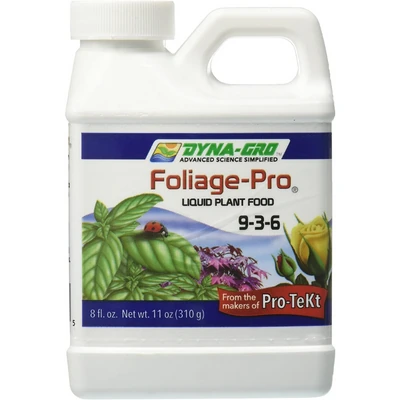
- Foliage pro is a 9-3-6 NPK fertilizer, which is great for pushing foliage development.
- It is a foliar application, so you get great results soonest possible.
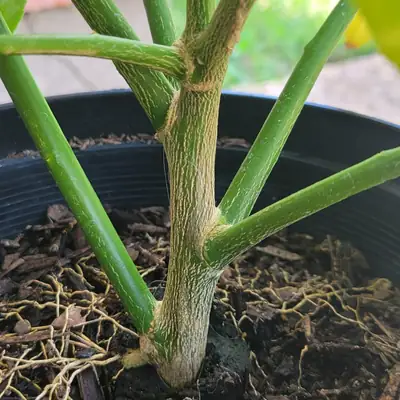
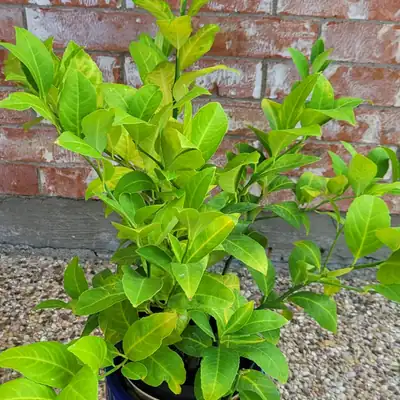
4. EarthPods Citrus and Fruit Formula

- Over 70 trace elements for healthy plants.
- Contains humic and fulvic acids.
- 100% chemical-free organic fertilizer.
- 0.2-0.2-0.4 NPK fertilizer analysis.
You can insert Earthpods pods in the pots of Meyers lemon, lime, orange, and kumquat trees to feed them. This makes application really easy, as you don’t have to measure the amounts you need to insert into the soil.
While you may think the NPK content in this fertilizer is very low, you get an additional 70+ trace elements that are great for citrus trees.
Each pod will break down gradually and slow-release nutrients to feed your citrus trees, making them grow steadily, blooming and fruiting at the right time.
Other organic nutrients found in Earthpods Citrus and Fruit Formula include fulvic acid, trace minerals, plant growth hormones, and humic acid.
5. Dr. Earth 708P Organic 9 Fruit Tree Fertilizer

- 5-5-2 NPK formulation.
- 100% organic fertilizer for indoor and outdoor plants.
- Promotes steady growth (no spikes).
- 3+ months of feeding in one application.
Dr. Earth Organic Fruit Tree Fertilizer is one of the fertilizers I’ve relied on for feeding fruit trees in my organic garden. It is a reliable 5-5-2 NPK source that does not exaggerate anything yet produces consistently good results.
If you want to get nicely-flavored fruits, this fertilizer is great because I particularly do not like feeds that produce growth spikes or spurts. This is usually replicated in fruits as well, leading to skewed taste.
What makes a good food for citrus trees and fruits is the inclusion of 8 different strains of ecto and endo mycorrhizae. These help improve plants’ drought tolerance to better survive the summer heat.
5. Espoma CT4 4-Pound Citrus-tone 5-2-6 Plant Food

- 5-2-6 NPK fertilizer analysis.
- Natural fertilizer with live microbes.
- Promotes flavorful citrus fruits.
- Great for root, foliage, bloom, and fruit development.
Having relied on the Espoma CT4 Citrus-tone plant food on my Persian lime and Meyers lemons, I’d recommend it as a good fertilizer for growing citrus and other indoor trees.
WIth this fertilizer, you get a load of trace elements. Magnesium is included in the formulation, making it a great choice for anyone trying to grow lemons in their garden.
Espoma uses chicken poop in most of its organic plant foods, which means a bit of smell can come out of them. That’s okay for my outdoor gardens, but I prefer odorless fertilizers for my indoor potted citrus trees.
The fertilizer does exactly what it promises – producing great growth, blooming, and adequate fruit yield.
6. J R Peters 52524 Jacks Classic 20-10-20 Citrus Feed

- 20-10-20 fertilizer NPK ratio.
- Contains essential micronutrients.
- Specifically formulated for citrus fruits.
- Root and leaf feed for optimum uptake.
Jack’s Classic is a highly effective fertilizer for tropical fruits because it provides a high load of nitrogen and potassium that’s needed in growing healthy citrus fruits in containers, including orange, lemon, Meyer lemons, kumquats, limes, and grapefruits.
Apart from the NPK balance, its dose of micronutrients will make a difference in the growth and development of your lemons, grapes, and limes.
I’ve seen improved foliage (more greens), bigger fruits, increased fruit yield, and stronger branches, especially in dwarf lemon varieties.
I always see quick, visible results within a week of applying Jack’s Classic Feed. I believe that owes to the soluble nature of the fertilizer, which makes it easy to absorb.
7. Miracle-Gro Fruit & Citrus Plant Food Spikes

- 15-5-10 NPK fertilizer analysis.
- Feeds the root zone directly with nutrients.
- Season-long feeding.
- Lush growth with more fruit when used.
Miracle-Gro Fruit and Citrus Plant Food Spikes are great for feeding plants directly around the root zon.
Use it for newly potted citrus trees as well as grown ones – both potted and outdoor citrus plants. It will feed the plants all season long.
8. Down To Earth Organic Citrus Fertilizer Mix 6-3-3

- 6-3-3 NPK fertilizer formula.
- OMRI certified 100% organic.
- Added calcium, sulfur, zinc, and iron.
- Contains micronutrients suitable for citrus fruit production.
- Promotes lush foliage, great blooms, and bountiful fruit.
This 6-3-3 NPK organic fertilizer for citrus fruits is one of my favorites because it supplies adequate nitrogen in my orange and lemon gardens.
It produces quick, visible results that last long, thanks to its slow-release nature.
Down To Earth Organic Citrus Fertilizer contains important nutrients such as iron, zinc, sulfur, calcium, and micronutrients that are needed to produce healthy, flavorful citrus fruits (grapefruits, oranges, tangerines, lemons, limes, etc.)
You can use it for outdoor large citrus trees and dwarf potted citrus varieties that grow indoors.
Caution: Be careful not to overfertilize because it’ll create mold over the soil. It can also cause burns, and possibly yellowing of leaves.
Liquid Fertilizer for Citrus Plants
I recommend the Southern Ag – 01902 – Citrus Nutritional Spray if you’re looking for liquid fertilizer for your lemons. It is great at preventing the yellowing of citrus foliage.
It contains zinc and other nutrients that help prevent deficiencies that cause weakness and discoloration in plants like lemons, oranges, lime, and tangerines.
Southern Ag Citrus Nutritional Spray Composition:
- Zinc 1.7%
- Magnesium 1.0%
- Iron 1.2%
- Manganese 1.2%
- Sulfur 4.1%.
Organic Fertilizer for Citrus Trees
If you’re growing citrus fruits, you want to use organic fertilizer on your trees. One of the best organic fertilizers for citrus is the 3-5-5 Jobe’s Organics 09226 FBA_B0030EK5JE Fruit & Citrus Fertilizer with Biozome. You can use it on new citrus trees or even those blooming and fruiting.
Homemade organic fertilizer for citrus
You can also make your own organic fertilizer at home. One option is using organic coffee grounds, which are high in nitrogen content and provide the slightly acidic pH that citrus fruits like.
Simply apply a handful of raw coffee grounds to the citrus tree pot or container and let it slow-release the nitrogen, and feed the citrus tree.
You can also use the leaves of a comfrey tree as a homemade organic plant food.
Chop the leaves, flowers, and stems of a comfrey tree and soak them in a jar of water. Put the jar in the sun for a full day for the organic material to ferment and release the nutrients. Strain and pour the water around your citrus tree to feed it.
This recipe produces an organic fertilizer rich in magnesium, potassium, and phosphorus, which is great mostly for new citrus and lemon trees.
When should citrus trees be fertilized?
Fertilize citrus plants once every two months when they’re growing actively – usually during spring and summer. During dormancy (fall and winter), spread the fertilizer application to about once every 3 months because the plant does not need a lot of nutrients during this time.
Maintain a regular fertilizer schedule for the citrus trees even when they look healthy and are growing just fine in order to produce fruit of the best quality.
Can I fertilize citrus when blooming?
Your citrus trees will require adequate fertilizer when blooming and fruiting. At this time, they’re heavy feeders, so it is important to fertilize them regularly without increasing the amount of fertilizer when they start flowering.
- Fertilize citrus trees early in spring before they bloom and bear fruit.
- If you fail to fertilize early in spring, wait until the fruit is fairly big (pea-sized) to apply fertilizer.
Following this schedule will help the trees produce fruit of good quality.


